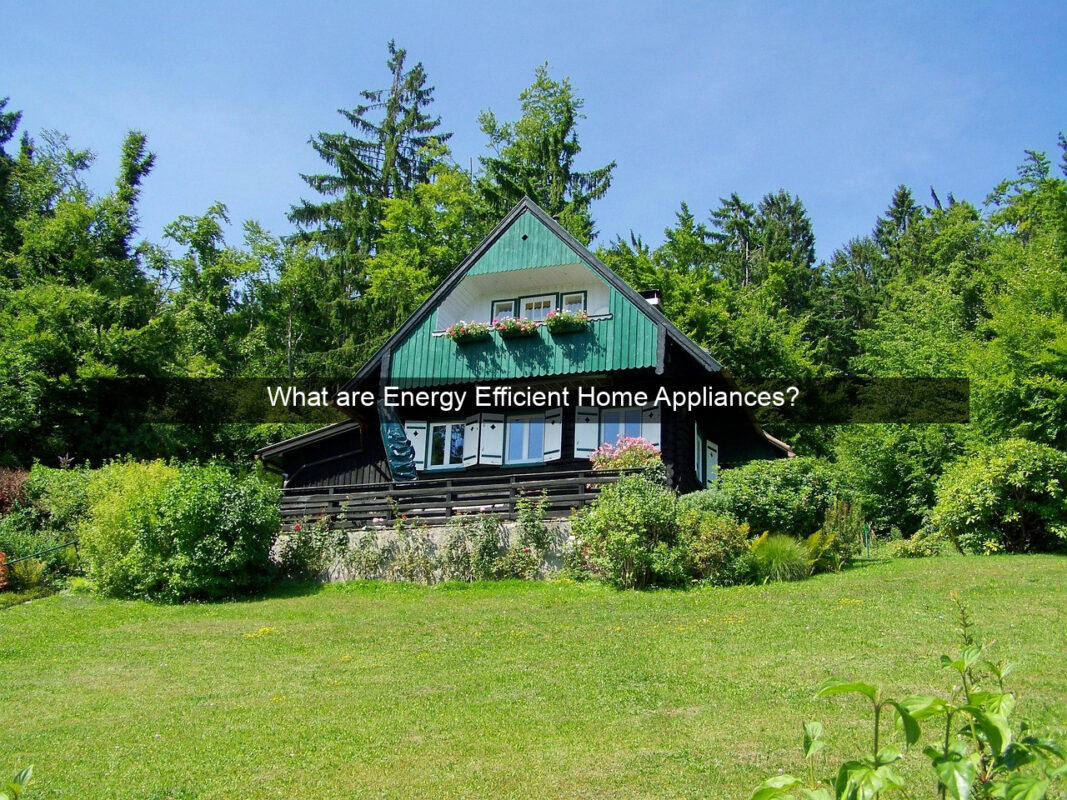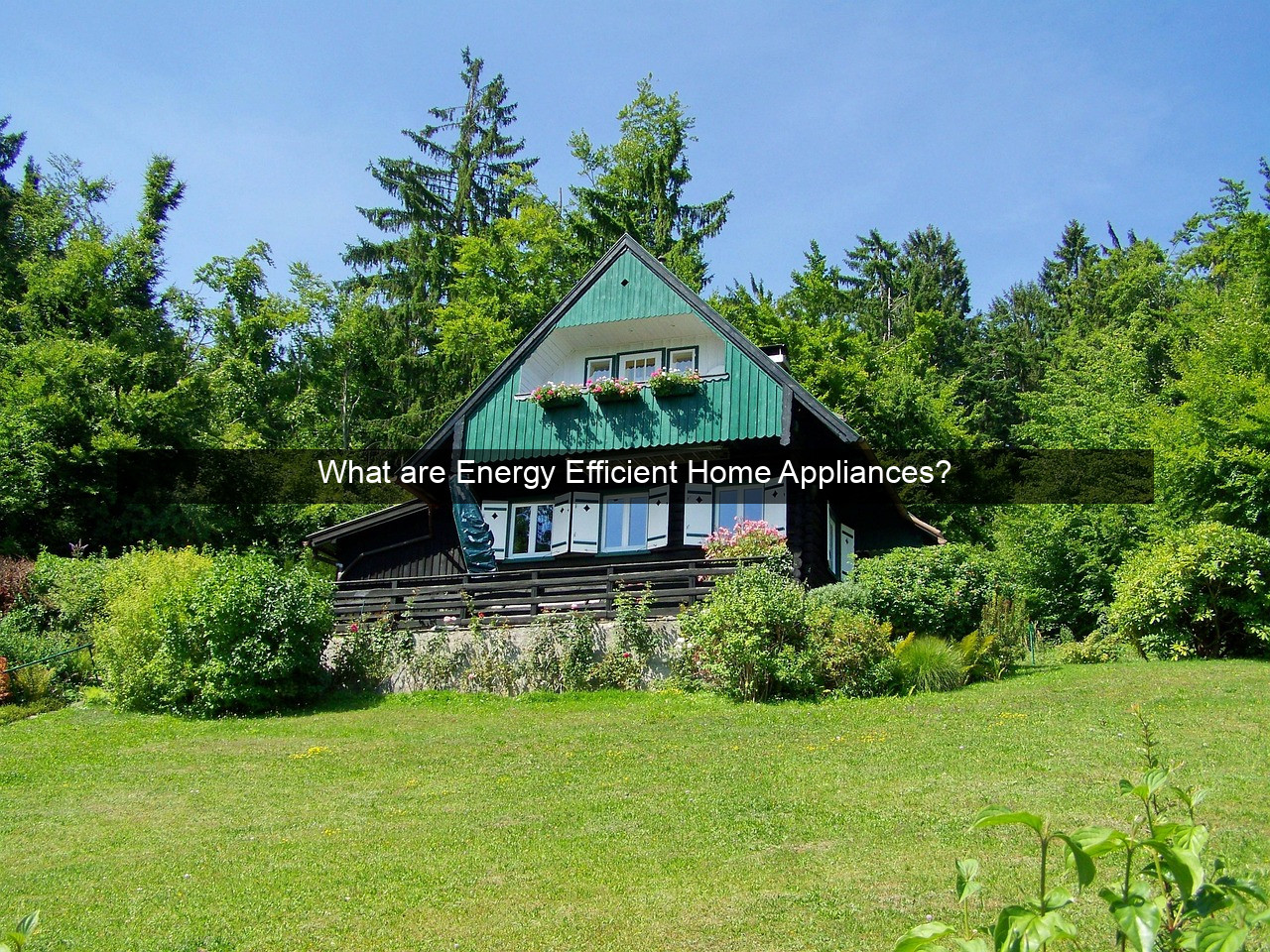What are Energy Efficient Home Appliances?

- What are Energy Efficient Home Appliances?
- What are Energy Efficient Home Appliances?
- Understanding Energy Efficiency Ratings
- Decoding Energy Labels
- The Role of Energy Star
- Key Features of Energy-Efficient Appliances
- Advanced Technologies for Energy Savings
- Benefits Beyond Energy Savings
- Choosing the Right Energy-Efficient Appliances
- Assessing Your Needs and Budget
- Long-Term Savings and Environmental Impact
- Conclusion

What are Energy Efficient Home Appliances?
In today’s world, where environmental consciousness is paramount and energy costs are steadily rising, energy-efficient home appliances are no longer a luxury but a necessity. These appliances are designed to perform the same functions as their conventional counterparts but consume significantly less energy, saving you money on utility bills and reducing your household’s carbon footprint. From refrigerators and washing machines to ovens and air conditioners, a wide range of energy-efficient options are available, making it easier than ever to create a more sustainable and cost-effective home. But what exactly makes an appliance energy-efficient? And how can you identify these appliances when shopping? This article delves into the world of energy-efficient appliances, exploring their benefits, key features, and how they contribute to a greener future.
Understanding Energy Efficiency Ratings

Decoding Energy Labels
One of the most important tools for identifying energy-efficient appliances is the energy label. These labels provide standardized information about an appliance’s energy consumption, allowing consumers to compare different models and make informed decisions. The labels typically include an energy rating scale, often ranging from A to G, with A being the most efficient and G the least. More advanced labels might also include pluses (A+, A++, A+++), indicating even higher levels of efficiency. Understanding these labels is crucial for making smart purchases and maximizing energy savings.
Energy labels also provide valuable data on annual energy consumption, water usage (for appliances like washing machines and dishwashers), and other relevant performance metrics. This information allows you to estimate the long-term operating costs of an appliance and compare it with other options. By carefully examining the energy label, you can identify the most cost-effective and environmentally friendly appliance for your needs.
Furthermore, energy labels are constantly evolving to reflect advancements in appliance technology. As manufacturers develop more efficient products, the rating scales are updated to ensure that consumers have access to the most up-to-date information. Keeping abreast of these changes will help you stay informed about the latest energy-saving innovations.
The Role of Energy Star
The Energy Star program is a joint initiative by the U.S. Environmental Protection Agency and the U.S. Department of Energy that promotes energy efficiency. Products that earn the Energy Star label meet strict energy-efficiency criteria and are certified to perform as well as or better than standard models. Looking for the Energy Star logo is a simple yet effective way to identify appliances that offer significant energy savings.
Energy Star certified appliances undergo rigorous testing to ensure they meet the program’s stringent requirements. This certification provides consumers with the assurance that they are investing in a product that has been independently verified for its energy-saving capabilities. Choosing Energy Star appliances can significantly reduce your household’s energy consumption and contribute to a healthier environment.
Moreover, the Energy Star program continually updates its criteria to reflect the latest advancements in technology. This ensures that the label remains a reliable indicator of superior energy efficiency. By choosing Energy Star certified products, you can stay at the forefront of energy-saving innovations and contribute to a more sustainable future.
Key Features of Energy-Efficient Appliances
Advanced Technologies for Energy Savings
Energy-efficient appliances often incorporate advanced technologies that optimize performance and minimize energy waste. These technologies can vary depending on the type of appliance. For example, refrigerators might use inverter compressors that adjust cooling power based on demand, while washing machines might feature advanced sensors that optimize water and detergent usage. Understanding these technologies can help you appreciate the value and benefits of investing in energy-efficient appliances.
In addition to specific technologies, many energy-efficient appliances utilize smart features that enhance convenience and control. These features might include programmable timers, remote monitoring capabilities, and integration with smart home systems. Such features not only improve user experience but also contribute to energy savings by allowing for more precise control over appliance operation.
Furthermore, the design and construction of energy-efficient appliances often prioritize durability and longevity. These appliances are built with high-quality components and materials that ensure reliable performance over an extended lifespan. This long-term reliability further enhances the value proposition of energy-efficient appliances, making them a wise investment for both your wallet and the environment.
Benefits Beyond Energy Savings
While the primary benefit of energy-efficient appliances is reduced energy consumption, there are several other advantages to consider. These appliances can contribute to lower utility bills, helping you save money over time. They also generate less noise and vibration, creating a quieter and more comfortable home environment.
Furthermore, by reducing energy consumption, these appliances help minimize your household’s carbon footprint and contribute to a healthier environment. This is a significant benefit considering the growing concern about climate change and the importance of sustainable living. Choosing energy-efficient appliances is a tangible way to make a positive impact on the planet.
Lastly, using energy-efficient appliances can enhance the overall value of your home. As energy efficiency becomes an increasingly important factor for homebuyers, investing in these appliances can make your property more attractive and potentially increase its resale value. This added value further strengthens the argument for choosing energy-efficient appliances as a smart long-term investment.
Choosing the Right Energy-Efficient Appliances
Assessing Your Needs and Budget
When selecting energy-efficient appliances, it’s essential to consider your specific needs and budget. Determine the size and capacity of the appliance that best suits your household and lifestyle. Compare different models and brands, paying attention to their energy efficiency ratings and features. Balancing your needs with your budget will help you make the most informed decision.
Researching different brands and models is crucial for finding the best value for your money. Read online reviews, compare prices, and consider the long-term operating costs of each appliance. This thorough research will empower you to choose an appliance that meets your needs and provides long-term value.
Don’t hesitate to seek advice from experts or consult with sales representatives at appliance stores. They can provide valuable insights and guidance on choosing the right appliance for your specific requirements. By gathering information from various sources, you can make a confident and informed decision.
Long-Term Savings and Environmental Impact
While the initial cost of energy-efficient appliances might be higher than conventional models, the long-term savings on utility bills can significantly outweigh the upfront investment. Calculate the potential energy savings over the appliance’s lifespan to assess the overall cost-effectiveness.
Consider the environmental impact of your choice. By opting for energy-efficient appliances, you are reducing your household’s carbon footprint and contributing to a more sustainable future. This environmental benefit adds significant value to your investment.
Finally, think about the long-term benefits of owning a durable and reliable appliance. Energy-efficient appliances are often built with high-quality components that ensure long-lasting performance. This durability translates to fewer repairs and replacements, further enhancing the value of your investment.
| Appliance | Energy Saving Tip |
|---|---|
| Refrigerator | Keep it full and avoid opening it frequently. |
| Washing Machine | Wash clothes in cold water and use the eco-cycle. |
- Look for the Energy Star label.
- Consider the appliance’s size and capacity.
- Compare different brands and models.
Conclusion
Investing in energy-efficient appliances is a smart choice for both your wallet and the environment. By understanding energy efficiency ratings, key features, and choosing appliances that meet your needs, you can significantly reduce your household’s energy consumption and contribute to a more sustainable future. The long-term savings on utility bills and the positive environmental impact make energy-efficient appliances a valuable investment for any homeowner.
What are the main benefits of using energy-efficient appliances?
The main benefits include lower energy bills, reduced environmental impact, and quieter operation.
How can I identify energy-efficient appliances?
Look for the Energy Star label and check the appliance’s energy efficiency rating.
Are energy-efficient appliances more expensive?
While the initial cost might be higher, the long-term savings on energy bills can offset the difference.
What types of appliances are available in energy-efficient models?
<p



